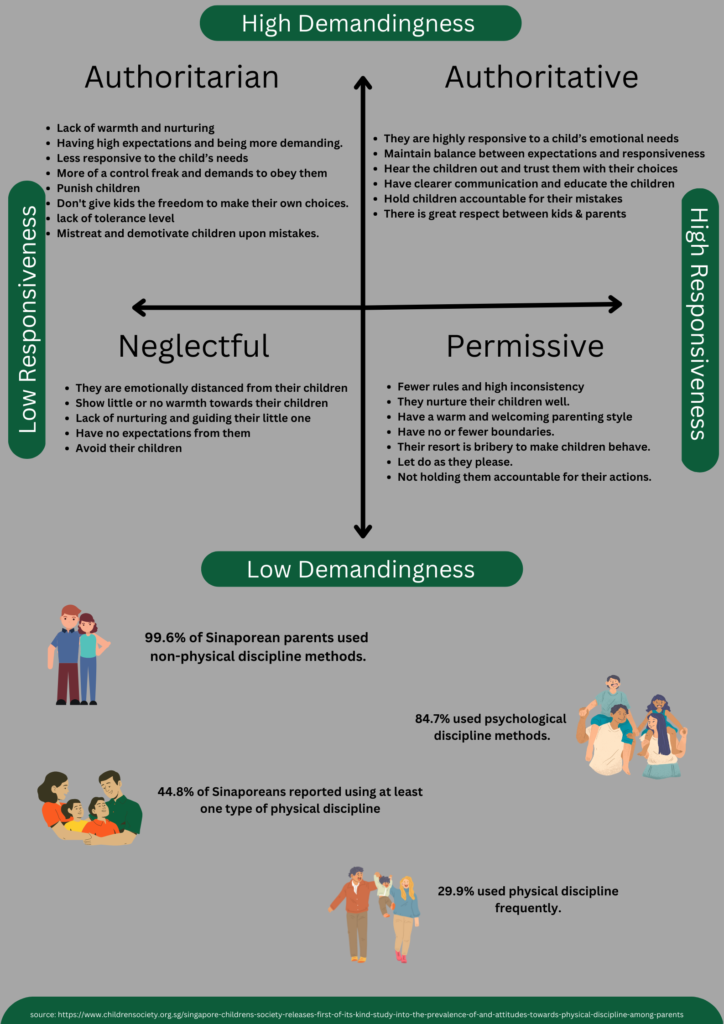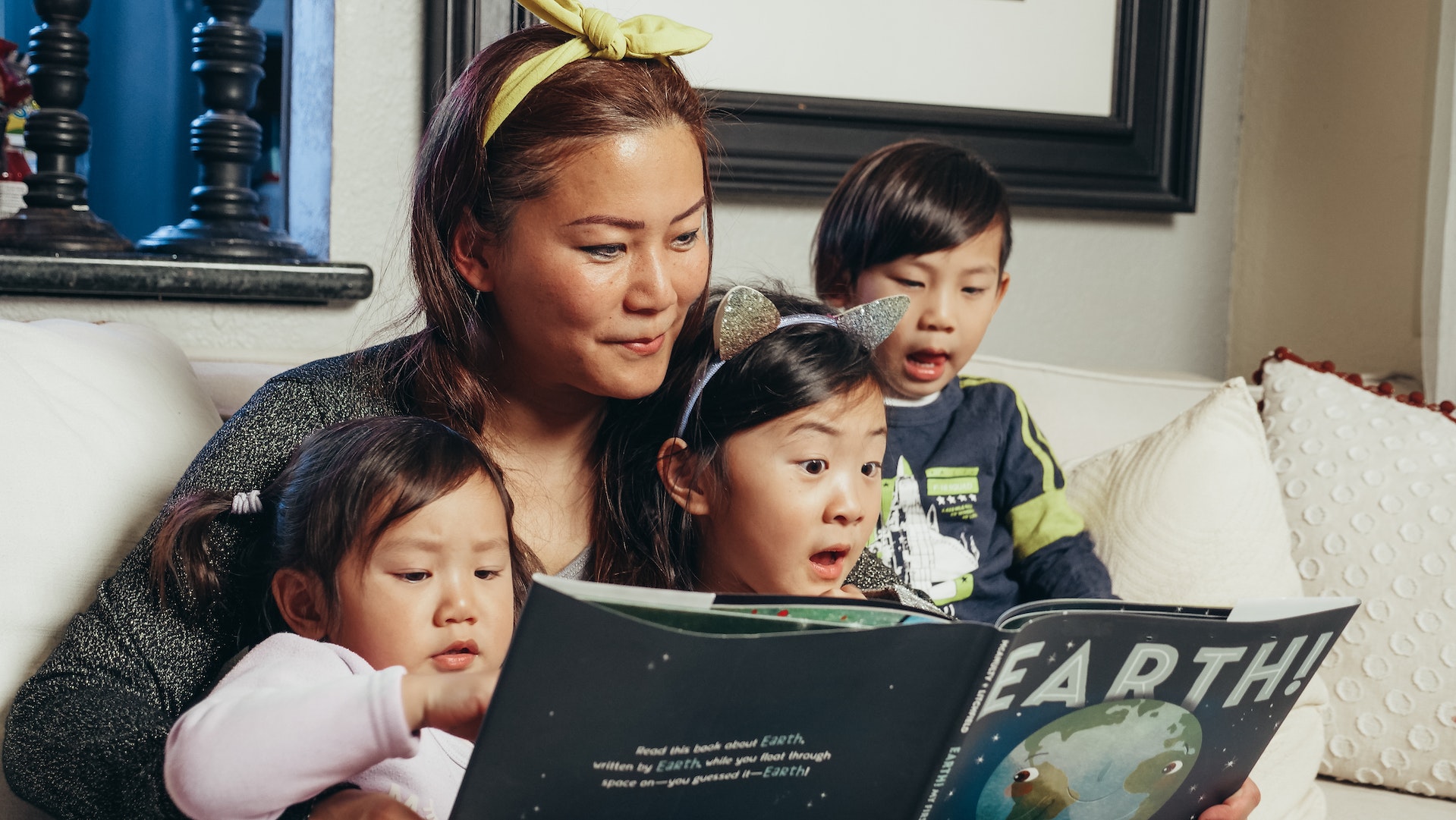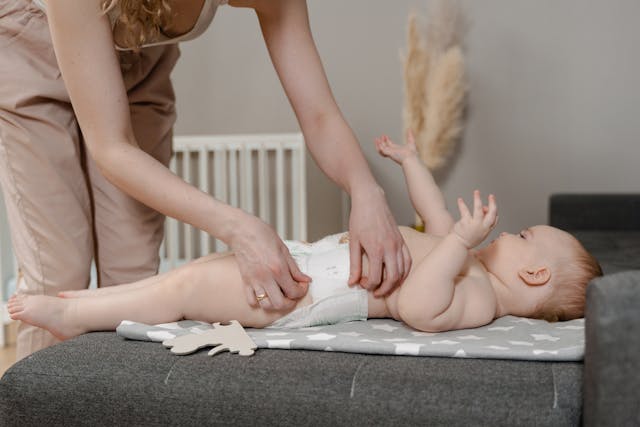Parenting Style Types in Singapore | Psychology Guide
In the early years of life—often referred to as the developing years—parents play a significantly important role and influence behaviour.
Parents’ approaches and implications of various parenting style types can create both; short-term and long-term impacts on their children. In actuality, it influences a variety of facets of a child’s life, including their behaviour in the home, how they interact with their peers and society, academic advancement, and much more.
Indeed, parents are the foundation of a child’s development. It is because they teach them a skill that will encourage them to lead their life on the best foot! They do so, by transforming a heavily dependent, immature child into a mature, understanding adult at the early stages of life.
Thus, to provide the best upbringing possible for the child, parents must balance the necessity for discipline and maturity that a child should have in order to fit in with their family and the wider community.
Otherwise, children may have trouble adjusting and adapting if their parents are unable to strike the right balance between these two factors, especially; during their preschool years.
Are there any parenting styles that aim to strike the right balance?
Perhaps, there are studies on successful styles of parenting available in today’s time to assist in striking the right balance.
What defines “good parenting” is a topic for a separate discussion. However, new parents almost certainly get advice and guidance from their parents and peers about the best parenting approach.
Indeed, figuring out the best parenting approach can be difficult.
The right parenting style commonly focuses on bridging cultural and socioeconomic gaps.
According to some studies, flexible and authoritative parenting style is best for borns in middle-class and white families, but this may not hold true in situations where there are unfavourable external factors.
Both internal and external environments should be safe for a child’s behaviour to enhance positivity.
However, a parenting approach that works well today; might not in the future. As children grow older and face new challenges, parenting strategies must change accordingly. It is inevitable. Thus, the right parenting style module must consider factors such as intellectual, behavioural, emotional, and many more at all times.
Exploring the 4 Different Parenting Styles:
Young children frequently imitate their parents and adopt their habits and behaviours.
And as they grow older, this transition to adolescence improves their comprehension skills and teaches them how to stand up for themselves.
And when that time comes, it will be a candid reflection of your parenting approach; it will be the realization that you have been molding your child’s character all along.
Thus, it is crucial to instill in them traits that will increase their courage and sense of self-worth.

What causes the impacts:
- The words that are spoken to children and how adults treat them both have an effect.
- What matters most is how it is communicated; including the parents’ body language, voice tone, seriousness level, their focus, emotional values, etc.
- Even parental beliefs and social precepts have an effect on children; to the extent that actions reflect them.
- Academic achievement, risky behaviours, and social reactions are all correlated with types of parenting practices during adolescence.
Perhaps parents who are able to maintain both; firm and friendly boundaries help shape their kids in the right direction.
Parenting style types are important because, as we’ve already discussed, they have an effect on a child’s demeanour and influence how they act and think.
However, if the parents have difficulty parenting and give conflicting messages, it may result in the child not having the proper balance. For instance, if the mother adopts a more permissive approach while the father adopts an authoritarian one, communication may become obstructed.
As a result, parents must develop a consistent parenting strategy.
What is the right parenting style?
Modern researchers have classified these Parenting style types into four categories.
- Authoritarian parenting
- Permissive parenting
- Authoritative parenting
- Neglectful parenting
How to determine the right parenting styles?
Undoubtedly, parents are free to choose what is best for their children.
While some parenting principles are better than others- some are more complex.
Using examples, let’s analyze it carefully in detail:
Authoritarian Parenting Style
In this style of parenting, there is an excessive amount of control- thus, parents fail to explain the importance of management and the need for boundaries. Hence, skipping a crucial step in the parenting process.
Due to their lack of sensitivity; parents frequently disregard their kids’ emotional needs in favour of expecting them to meet their own demands.
A lot of negativity is introduced by this parenting approach.
High Levels of Control & Low Levels of Sensitivity
Traits of authoritarian parents
- Lack of warmth and nurturing
- Having high expectations and being more demanding.
- Less responsive to the child’s needs
- More of a control freak and demands to obey them
- Punish children
- Do not give children the freedom to make their own choices.
- lack of tolerance level
- Mistreat and demotivate children upon mistakes.
Characteristics of children under authoritarian parents
- Have low self-esteem
- Insecure about their capabilities.
- Develop poor social and communication skills
- doubtful of themselves and lacking in confidence
- Showcase harsh and violent behaviours.
- Fear of trying out new things and exploring
- Lack of self-control and emotional stability
- more prone to develop mental health issues such as anxiety and depression.
Permissive Parenting Style
This group of parents is prone to being more concerned with short-term solutions than long-term effects.
Consequently, allowing them to behave as they please.
To be kind is undoubtedly a virtue in parenting, but it is insufficient to groom a child properly.

Low levels of control & High levels of interactiveness
Traits of permissive parents:
- Fewer rules and high inconsistency
- They nurture their children well and are more loving towards them.
- Have a warm and welcoming parenting style
- Have no or fewer boundaries.
- Their resort is bribery to make children behave.
- Instead of imparting the proper morals and obligations to ditched children, let them do as they please.
- Not holding them accountable for their actions.
Characteristics of children with permissive parents
- Given that they are not expected to do anything at home because of their overly accommodating nature, they frequently perform poorly and lack accomplishments.
- Since they are given everything, they often rebel when their expectations are not met, or they are told no.
- Showcase aggression instead of understanding emotions.
- Lack of self-control and discipline
- Poor social and management skills
- Have selfish behaviour with others.
- Irresponsible
- They become self-centred.
- They think they are powerful and bully others.
Authoritative Parenting Style
As previously mentioned, this parenting style emphasizes both; high control and responsiveness.
Hence, it is a well-balanced technique, as they equally respond to their children’s needs along with their expectations.
With clear boundaries, consistency, warmth, and care, authoritative parents adopt the right parenting style.
Have both high levels of Control and Responsiveness
Traits of authoritative parents-
- They are highly responsive to a child’s emotional needs
- Maintain a proper balance between expectations and responsiveness
- Hear the children out and trust them with their choices
- Set clear behavioural limits and create the required awareness
- Have clearer communication and educate the children instead of demanding they follow blindly
- Hold children accountable for their mistakes and use positive punishment technique
- There is great respect between both; parents and children.
Characteristics of children under authoritative parents-
- Cheerful, active and happy kids
- Independent and courageous enough to make choices
- Have good social and communication skills
- Develop great self-control, emotional stability, and self-esteem
- Engage less in violent and harmful behaviours
- More adventures and open to exploring
- Have a healthy mental well-being
Neglectful parenting Style
Additionally known as; the uninvolved parents. This parenting approach is in no way beneficial. Perhaps; giving your child away would ruin your reputation as a failing parent; and more or so, the child’s future!
Your child needs more than just food and a roof over their head.

Lack of both responsiveness and control
Traits of neglectful parents:
- They are emotionally distanced from their children
- Show little or no warmth towards their children
- Lack of nurturing and guiding their little one
- Have no expectations from them
- Avoid their children
Characteristics of children under neglectful parents-
- Feel unloved and neglected
- They learn to be self-dependent
- Develop social anxiety and face difficulties in moving with people
- Have little or no interest in performance as nobody is expecting them to perform
- High risk of being bullied
- Can develop mental health issues.
Sub Types of Parenting Styles
Free-Range Parenting:
Free Range Parenting encourages independence and self-sufficiency in children. Parents who adopt this style prioritize autonomy and decision-making skills, allowing their children to explore the world, take risks, and learn from their experiences. It promotes a sense of freedom and fosters resilience and problem-solving abilities in children.
Helicopter Parenting:
Helicopter Parenting involves overprotectiveness and excessive involvement in a child’s life. These parents closely monitor and control their child’s activities, often stepping in to prevent potential harm or failure. While well-intentioned, this style can hinder a child’s independence and hinder their ability to develop essential life skills.
Snowplow Parenting:
Snowplow Parenting revolves around removing obstacles and challenges from a child’s path to ensure their success and happiness. These parents are highly interventionist, clearing away difficulties their child may encounter. While done out of love, this approach can lead to a lack of resilience and self-reliance in children.
Lighthouse Parenting:
Lighthouse Parenting strikes a balance between support and independence. These parents provide guidance, love, and a safe environment while allowing their children to make their own choices and learn from their experiences. This approach emphasizes open communication, trust, and fostering independence.
Attachment Parenting:
Attachment Parenting focuses on developing a strong emotional bond between parent and child. This style emphasizes responsiveness, nurturing, and physical closeness. Parents practicing attachment parenting strive to meet their child’s needs promptly, creating a secure and trusting relationship that promotes emotional well-being and confidence.
Tiger Parenting:
Tiger Parenting emphasizes high expectations, discipline, and academic achievement. Parents following this style set rigorous standards and push their children to excel academically and in other areas of life. While it may yield impressive results, it can also create immense pressure and stress on the child.
There are different types of parenting principles covered above; and the most ideal of them all is; the authoritative parenting style.
Although parenting styles significantly impact a child’s lifestyle, they should not be held solely responsible.
A child raised using an Authoritative Parenting Style has a good chance of developing addictions to bad behaviours, whereas; a child raised using a Neglectful Parenting Style has a better chance of breaking the cycle of poverty and paving the way for a better future for their own children.
Positive parenting may be encouraged to ensure a fulfilling and vibrant parent-child relationship.
Therefore, the secret to the right parenting style is; finding the balance. Balance that works for your child at every stage of their development!
Written by: Maryam
BA Early Childhood Education with Psychology
Singapore Parenting Style Statistics










